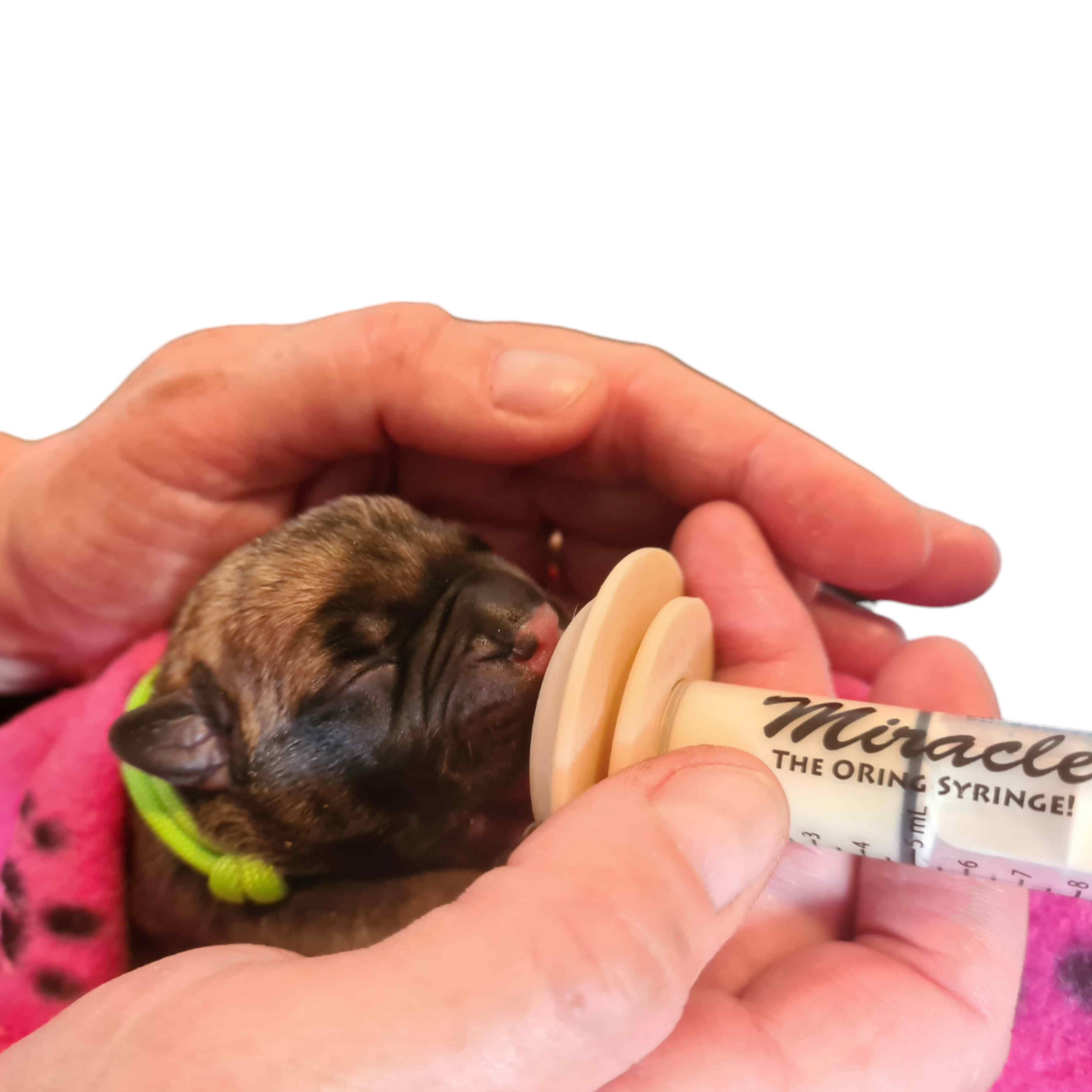Wombaroo
Wombaroo Dog Milk Replacer
Wombaroo Dog Milk Replacer
Couldn't load pickup availability





Product Description
Wombaroo Dog Milk Replacer is a nutritionally balanced milk substitute for all dog breeds. Use for orphaned puppies or when mother’s milk is limited.
Key Features
- Specifically formulated to match the composition of bitch's milk
- Elevated fat content for improved growth rate of puppies
- Low in lactose to aid in digestion
Making up Milk
To make 30mL of milk: Mix 1 level scoop (6.5g) of powder with 25ml of warm water.
To make 1 litre of milk: Mix 215g of powder with 850ml of warm water.
Add about half the water to the powder first and mix to a paste. Then add the remaining water and mix thoroughly. Pre-boil the water to ensure it is sterilised. If the water is too hot it can cause the milk to curdle. If it is too cold then it will be difficult to disperse the powder. An electric whisk can be used for mixing larger quantities. Milk can be stored in the fridge for up to a day or can be frozen for up to 2 weeks. It is useful to make milk up in larger volumes, and store it frozen in small portions (e.g. ice cube trays), so that the required daily feed volumes can be easily thawed out. Once thawed out, discard any unused milk, and wash feeding utensils thoroughly.
Feeding Guide
Warm milk to about 35°C. Feed every 2 hours for the first 3 days, reducing this to every 4 hours by week one and every 6 hours by week two. Stimulate puppies to defecate and urinate after each feed. Encourage puppies to lap once their eyes are open and voluntary bowel motions begin. To avoid dehydration during periods of hot weather give drinks of pre-boiled water between feeds. Always provide access to drinking water once puppies eyes are open and they become active. Consult your veterinarian or breeder for particular advice about caring for your breed of puppy.
Growth
Different breeds of puppies have different growth rates. Carers should contact their veterinarian or breeder for information about the growth rate of their particular breed. Guidelines for birth weight, weaning weight and average growth rate for various breed categories are as follows:
| Breed | Birth Weight (g) |
Weaning Weight (kg) |
Average Weight Gain (g/day) |
| Teacup | 90 | 0.5 | 7 |
| Toy | 180 | 1.0 | 15 |
| Small | 250 | 1.4 | 20 |
| Medium | 300 | 3.2 | 50 |
| Large | 450 | 8.0 | 135 |
| Giant | 700 | 10 | 170 |
Consistent weight gain is an indication of good health. It is important to weigh puppies regularly to verify growth rate and to determine daily feed volumes. Overfeeding milk can cause diarrhoea so feed the suggested volumes in our tables.
Weaning
When puppies are about 4 weeks old they should show interest in solid food. To entice them to eat solids offer a small portion of specially formulated puppy dry food soaked in milk. Once they start to eat solid food continue to increase the solids and reduce the milk in their diet until they are fully weaned at about 8 weeks.
Ingredients
Whole milk solids, whey protein, casein, vegetable oils, omega-3 & 6 fatty acids, taurine, vitamins A, B1, B2, B3, B5, B6, B9, B12, C, D3, E, K, biotin, folic acid, choline, calcium, phosphorus, potassium, sodium, magnesium, zinc, iron, manganese, copper, iodine, selenium.
Typical Analysis
Protein 34% Fat 37%Ash 5%Moisture 4%Energy (ME) 23 MJ/kg
Additional Information
When not in use, Wombaroo Dog Milk Powder should be stored in a dry, cool place in an airtight container to prevent moisture contamination and spoilage. Do not store the powder in the refrigerator, as condensation can lead to microbial growth, nor in the freezer, as ice crystals can disrupt the fat emulsion when reconstituting the powder.
Frequently Asked Questions
See our FAQs below, If you can’t find the answer you’re looking for, feel free to contact us and we’ll get back to you shortly.
Q: What is Wombaroo Dog Milk Replacer used for?
A: It’s a nutritionally balanced milk substitute for puppies when mother’s milk is unavailable or insufficient. Suitable for all dog breeds.
Q: Is this milk replacer safe for newborn puppies?
A: Yes, it is specially formulated to match the composition of a bitch’s milk, with elevated fat content and low lactose to aid digestion.
Q: How do I prepare Wombaroo milk?
A: Mix 1 scoop (6.5 g) of powder with 25 ml of pre-boiled warm water for a 30 ml feed. Always mix thoroughly and avoid using water that is too hot or too cold.
Q: Can I store prepared milk?
A: Yes, it can be stored in the fridge for 24 hours or frozen for up to 2 weeks in small portions. Thawed milk must be discarded after use.
Q: How often should I feed newborn puppies?
A: The Wombaroo Dog instructions recommend feeding every 2 hours for the first 3 days, then every 4 hours by week one, and every 6 hours by week two. Adjust based on your vet’s advice and the puppy’s growth.
Q: What temperature should the milk be before feeding?
A: Milk should be warmed to approximately 35°C before feeding.
Q: When should I start weaning puppies off the milk?
A: Puppies usually begin showing interest in solids around 4 weeks of age. Start by offering soft puppy food soaked in milk, and gradually reduce milk feeds until weaning is complete by 8 weeks.
Q: What breeds is this suitable for?
A: It’s suitable for all breeds—from teacup and toy breeds to giant breeds like Great Danes. Feeding amounts vary based on breed and growth rate.





